Laura from Sorrow at Sills Bend, ably supported by Georg from Stack and Genevieve from You Cried for Night, has gathered together a team of bloggers at Sarsaparilla, a new blog about Australian literature, media and culture, named for the mythical Sydney suburb of Patrick White's dreams and nightmares.
Less than 48 hours old, and the joint is jumping already. Check it out. You might even see someone you know.
Monday, May 29, 2006
Saturday, May 27, 2006
That'd be right
Which of Henry VIII's wives are you?
this quiz was made by Lori Fury
Thanks to Ampersand Duck. I think.
Monday, May 22, 2006
South Australian Music Sunday
Those familiar with Adelaide will know that North Adders is quite a hilly bit and there is a lot of big sky when you look south back over the city. And so it was yesterday, with a lot of red and gold trees against a purply-black rain-laden sky. I know this because I was there, heading for a big 19th century church made out of some sort of creamy stone to hear one of my unofficial godchildren singing in her Old Scholars' combined choir.
The idea of this young woman being an Old Scholar of anywhere is something I still can't get my head around, but then I'm still not used to the idea of her studying aerospace engineering, either.
I was not prepared for the smallness and exclusivity of this group -- fewer than 20 -- nor for their amazing quality. I knew she was good, but I wasn't quite up with how good she is. They sang Mozart and Vivaldi and Byrd. They were great. The two female soloists, two-thirds of a highly prized young Adelaide group called eve, were Emma Horwood (centre), the granddaughter of my old English and History teacher at Adelaide Girls' High back in the mists of time, and Greta Bradman (left), granddaughter of Sir Don.
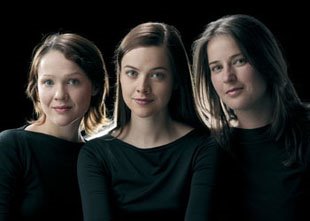
And as I made my way home along the river through the Parklands, watching out for ducks, Music Deli began on RN. They had a live recording of Phil Manning, the Yearlings, and Vika and Linda Bull, all playing last month at a free concert in the Lameroo Memorial Hall. I was reminded again that quality trumps genre every time, and that Byrd, Mozart and Vivaldi would probably all have really enjoyed it.
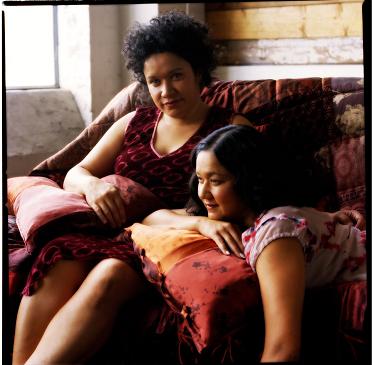
The choral concert, mainly a bit of homage to Vivaldi by way of a change in this Mozart-saturation anniversary year, featured a program with some information about him:
'Vivaldi was trained as a priest and ordained in 1703 ... He is reported to have sometimes left the altar during Mass to note down musical thoughts in the sacristy.
In Venice Vivaldi was revered more as a violin virtuoso than as a composer. His violin playing was "furious". A witness stated "... he appended a cadenza which really frightened me, for such playing has never been nor can be: he brought his fingers up to only a straw's distance from the bridge, leaving no room for the bow -- and that on all four strings, with imitations and incredible speed."
In July 1741 he died in Vienna, "of internal fire", most likely asthmatic bronchitis.'
I don't know about the asthmatic bronchitis, though. I think he probably died of internal fire.

The idea of this young woman being an Old Scholar of anywhere is something I still can't get my head around, but then I'm still not used to the idea of her studying aerospace engineering, either.
I was not prepared for the smallness and exclusivity of this group -- fewer than 20 -- nor for their amazing quality. I knew she was good, but I wasn't quite up with how good she is. They sang Mozart and Vivaldi and Byrd. They were great. The two female soloists, two-thirds of a highly prized young Adelaide group called eve, were Emma Horwood (centre), the granddaughter of my old English and History teacher at Adelaide Girls' High back in the mists of time, and Greta Bradman (left), granddaughter of Sir Don.

And as I made my way home along the river through the Parklands, watching out for ducks, Music Deli began on RN. They had a live recording of Phil Manning, the Yearlings, and Vika and Linda Bull, all playing last month at a free concert in the Lameroo Memorial Hall. I was reminded again that quality trumps genre every time, and that Byrd, Mozart and Vivaldi would probably all have really enjoyed it.

The choral concert, mainly a bit of homage to Vivaldi by way of a change in this Mozart-saturation anniversary year, featured a program with some information about him:
'Vivaldi was trained as a priest and ordained in 1703 ... He is reported to have sometimes left the altar during Mass to note down musical thoughts in the sacristy.
In Venice Vivaldi was revered more as a violin virtuoso than as a composer. His violin playing was "furious". A witness stated "... he appended a cadenza which really frightened me, for such playing has never been nor can be: he brought his fingers up to only a straw's distance from the bridge, leaving no room for the bow -- and that on all four strings, with imitations and incredible speed."
In July 1741 he died in Vienna, "of internal fire", most likely asthmatic bronchitis.'
I don't know about the asthmatic bronchitis, though. I think he probably died of internal fire.

Sunday, May 21, 2006
Women in Labor: some questions
The week before last, I took part in a survey that put Julia Gillard well out in front as preferred federal Labor leader. Of the five names on offer, she got 35% of the vote -- and this from a sample of over 1,200 respondents in which men outnumbered women 2-1.
Then came Kevin Rudd with 20%, and after him, wait for it, Paul Keating with 15%. Kim Beazley limped in fourth at 10% -- less than the 12% 'uncommitted vote' -- and Bill Shorten barely rated.
So. Has it occurred to anyone else that the Labor Right's great big push to fast-track Shorten might be as much an anti-Gillard move as it is a pro-Shorten one? Is this a conscious move to defeat the Left, or the unconscious ignoring of the woman in the equation that most women over 40 have experienced at some point in our careers? Is the Right acting on homosocial groupthink, or on the unacknowledged assumption that a factional victory is more important than a Party one?
Either way, are they going to stuff up the most promising prospect of a female federal party leader that Australia has ever had?
And if they do, will we be surprised?
Then came Kevin Rudd with 20%, and after him, wait for it, Paul Keating with 15%. Kim Beazley limped in fourth at 10% -- less than the 12% 'uncommitted vote' -- and Bill Shorten barely rated.
So. Has it occurred to anyone else that the Labor Right's great big push to fast-track Shorten might be as much an anti-Gillard move as it is a pro-Shorten one? Is this a conscious move to defeat the Left, or the unconscious ignoring of the woman in the equation that most women over 40 have experienced at some point in our careers? Is the Right acting on homosocial groupthink, or on the unacknowledged assumption that a factional victory is more important than a Party one?
Either way, are they going to stuff up the most promising prospect of a female federal party leader that Australia has ever had?
And if they do, will we be surprised?
Thursday, May 18, 2006
Advertising isn't what it used to be

Recruiting crew for his Antarctic voyage of 1914-17 aboard the Endurance, Ernest Shackleton posted the following ad:
'Men wanted for hazardous journey. Small wages, bitter cold, long months of complete darkness, constant danger, safe return doubtful. Honour and recognition in case of success.'
Is this an extreme example of anti-spin, or just really, really psychologically astute? (See 'hero journey', below.)
So, who's responsible?
Six years of stress and distress -- for the woman, her family, the doctors, the hospital and God only knows who else, as the ripples from this kind of thing widen and widen beyond anyone's knowledge.
But I'm sure he sleeps soundly, knowing that he has expressed his individuality fully and has acted on his well-known sense of honour.
Story here.
But I'm sure he sleeps soundly, knowing that he has expressed his individuality fully and has acted on his well-known sense of honour.
Story here.
Tuesday, May 16, 2006
Turning Japanese
Apparently my Japanese name is 吉国 Yoshikuni (good fortune country) 千秋 Chiaki (very fine in autumn).
This is an astonishingly good fit with what it means in English. If only it were all true.
Created with Rum and Monkey's Name Generator.
The journey of the hero
There seems to be a bit of fussing lately, both in print and online, about whether 'heroes' is an appropriate word for Beaconsfield survivors Todd Russell and Brant Webb.
Cue literary and cultural theorist Joseph Campbell, whose groundbreaking midcentury study The Hero with a Thousand Faces developed a notion grounded in Jungian archetype theory of a universal narrative pattern he called a 'monomyth' of the hero figure in all cultures.
Obviously there are wrangles to be had around cultural relativism and the ideological implications of this kind of psychoanalytic thinking. For the moment, though, this excellent little Wikipedia summary of Campbell's theory -- emphasis mine -- is food for some thought about the Beaconsfield rescue, and about not only the survivors but also the rescuers:
'The monomyth involves the hero receiving a "call to adventure" – to leave the ordinary world which he has psychologically or spiritually outgrown. After passing "threshold guardians" (often with the aid of a wise mentor or spirit guide) the hero enters a dreamlike world – generally a dark forest, a desert, an underworld or a mysterious island. After a series of trials in which the hero eventually surpasses his mentor, the hero achieves the object of his quest (often an atonement with the father, a sacred marriage or an apotheosis) before returning to his homeland, bringing with him a spiritual boon. Campbell wrote that almost all hero myths, throughout history and across cultures, can be shown to contain at least a subset of these patterns.'
The 'object of the quest' was obviously to get them(selves) out alive; you could say that the 'spiritual boon' was not only the sigh of collective national relief and happiness that went up, but also the new knowledge that the unprecedented rescue techniques and experiments have provided for mining practices and emergency services around the world.
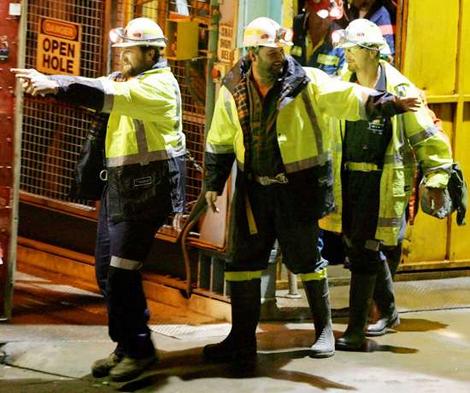
Cue literary and cultural theorist Joseph Campbell, whose groundbreaking midcentury study The Hero with a Thousand Faces developed a notion grounded in Jungian archetype theory of a universal narrative pattern he called a 'monomyth' of the hero figure in all cultures.
Obviously there are wrangles to be had around cultural relativism and the ideological implications of this kind of psychoanalytic thinking. For the moment, though, this excellent little Wikipedia summary of Campbell's theory -- emphasis mine -- is food for some thought about the Beaconsfield rescue, and about not only the survivors but also the rescuers:
'The monomyth involves the hero receiving a "call to adventure" – to leave the ordinary world which he has psychologically or spiritually outgrown. After passing "threshold guardians" (often with the aid of a wise mentor or spirit guide) the hero enters a dreamlike world – generally a dark forest, a desert, an underworld or a mysterious island. After a series of trials in which the hero eventually surpasses his mentor, the hero achieves the object of his quest (often an atonement with the father, a sacred marriage or an apotheosis) before returning to his homeland, bringing with him a spiritual boon. Campbell wrote that almost all hero myths, throughout history and across cultures, can be shown to contain at least a subset of these patterns.'
The 'object of the quest' was obviously to get them(selves) out alive; you could say that the 'spiritual boon' was not only the sigh of collective national relief and happiness that went up, but also the new knowledge that the unprecedented rescue techniques and experiments have provided for mining practices and emergency services around the world.

But it's only dress-ups ...
From crikey.com.au in their 'Unsubstantiated Tips and Rumours' section today:
'One of my girls goes to school with the daughter of a senior federal cabinet minister. I was quite horrified to hear she was holding a fancy dress party where all of the guests were to come dressed as homeless people. Considering that most homeless people are either mentally ill or drug dependent, I would have thought that the minister would have been a little more sensitive to their plight.'
Come back, Prince Harry in your Nazi clobber, you comparatively sensitive poppet, you. All is forgiven.
So ... Which senior federal cabinet minister(s) has/have school-age daughters?
'One of my girls goes to school with the daughter of a senior federal cabinet minister. I was quite horrified to hear she was holding a fancy dress party where all of the guests were to come dressed as homeless people. Considering that most homeless people are either mentally ill or drug dependent, I would have thought that the minister would have been a little more sensitive to their plight.'
Come back, Prince Harry in your Nazi clobber, you comparatively sensitive poppet, you. All is forgiven.
So ... Which senior federal cabinet minister(s) has/have school-age daughters?
Monday, May 15, 2006
The shame sets in ...

1) ... that I didn't know more about Rick Farley, who was my exact contemporary, and
(2) that even if I work my butt off from now till I'm 75, I'll never achieve as much as he did.
Technophobe v. spammer
I just discovered some spam from yesterday that was rather cunningly done via Blogger. But can anyone tell me how they got past the word verification thingy? Or are there now teams of slaves, akin to the armies of call-centre staff, who actually sit there manually spamming blog by blog?
What is it with the capitalist mind?
What is it with the capitalist mind?
Saturday, May 13, 2006
What I saw as night fell
I went to a cocktail party tonight at Adelaide's Carrick Hill, to celebrate the 60th birthday of the colourful character who owns the bookshop that I mind for her on Saturdays. Went straight from the bookshop, in fact, pausing only to dust myself down and swap the trainers for suede boots with heels and the cardy for a figured velvet coat.
The Downers were among the guests, if that gives you any idea of what sort of Adelaide do this was. Whenever I think I'm going to feel intimidated by what other people are wearing, I bring out the filigree-fine necklace of silver teardrops from Tiffany's that my best mate gave me for one of my own major birthdays, so I had that on as well.
Great party, good speeches, fab food, saw a couple of people I adore, and heard a really, really happy-making piece of gossip. But the highlight of the evening was the view back across the Adelaide plain as I walked down the path towards the party. This is actually the view from a different angle and rather higher up and further away than Carrick Hill, but you get the gist:

The Downers were among the guests, if that gives you any idea of what sort of Adelaide do this was. Whenever I think I'm going to feel intimidated by what other people are wearing, I bring out the filigree-fine necklace of silver teardrops from Tiffany's that my best mate gave me for one of my own major birthdays, so I had that on as well.
Great party, good speeches, fab food, saw a couple of people I adore, and heard a really, really happy-making piece of gossip. But the highlight of the evening was the view back across the Adelaide plain as I walked down the path towards the party. This is actually the view from a different angle and rather higher up and further away than Carrick Hill, but you get the gist:

Friday, May 12, 2006
Full moon tomorrow night

THE CAT AND THE MOON
by W. B. Yeats
THE cat went here and there
And the moon spun round like a top,
And the nearest kin of the moon,
The creeping cat, looked up.
Black Minnaloushe stared at the moon,
For, wander and wail as he would,
The pure cold light in the sky
Troubled his animal blood.
Minnaloushe runs in the grass
Lifting his delicate feet.
Do you dance, Minnaloushe, do you dance?
When two close kindred meet.
What better than call a dance?
Maybe the moon may learn,
Tired of that courtly fashion,
A new dance turn.
Minnaloushe creeps through the grass
From moonlit place to place,
The sacred moon overhead
Has taken a new phase.
Does Minnaloushe know that his pupils
Will pass from change to change,
And that from round to crescent,
From crescent to round they range?
Minnaloushe creeps through the grass
Alone, important and wise,
And lifts to the changing moon
His changing eyes.
Wednesday, May 10, 2006
The wisdom of age
I've just had one of those circulating e-mails from a friend, along 'Things I've learned in life' lines. Here are three highlights I think are particularly accurate.
** Depression is just anger without the enthusiasm.
** Artifical intelligence is no match for natural stupidity.
** Whatever hits the fan will not be evenly distributed.
** Depression is just anger without the enthusiasm.
** Artifical intelligence is no match for natural stupidity.
** Whatever hits the fan will not be evenly distributed.
Tuesday, May 09, 2006
How do you reckon?
Was just woken out of a sound sleep at 5.30 am by an SMS from my little sister saying Get up and put the telly on, so was able to see Brant Webb and Todd Russell emerge from the mine shaft, take their tags down off the wall where they'd been for the last fortnight, and put their arms round their wives.
After they'd been carted off to hospital an impromptu press conference developed with one of the rescue workers, a very cool dude called Rex Johnson, who gave a detailed and articulate account of the last half-hour or so of the rescue. When someone asked the inevitable idiot journo question, 'How did you feel when you saw them?', Johnson raised an eyebrow a fraction at the journo, made a wry face and said 'Well, we still had a job to do.'
After they'd been carted off to hospital an impromptu press conference developed with one of the rescue workers, a very cool dude called Rex Johnson, who gave a detailed and articulate account of the last half-hour or so of the rescue. When someone asked the inevitable idiot journo question, 'How did you feel when you saw them?', Johnson raised an eyebrow a fraction at the journo, made a wry face and said 'Well, we still had a job to do.'
Saturday, May 06, 2006
The stars in the two-star hotel
When you're trapped a kilometre under ground, how long can you hold your nerve? Has everyone in the country imagined themselves in the miners' place and wondered how, or whether, they would get through it?
Will these two be mates for life or will they never want to see each other again?
The people who believe in prayer are praying, and the rest of us are wondering whether the force of collective will could possibly make any difference to what happens.
'If everything goes to plan,' says the Age this morning, 'the miners are expected to be free from their entrapment this afternoon and above ground four hours later, when machinery is cleared from their path.'
Will these two be mates for life or will they never want to see each other again?
The people who believe in prayer are praying, and the rest of us are wondering whether the force of collective will could possibly make any difference to what happens.
'If everything goes to plan,' says the Age this morning, 'the miners are expected to be free from their entrapment this afternoon and above ground four hours later, when machinery is cleared from their path.'
Thursday, May 04, 2006
I heart genealogy, too
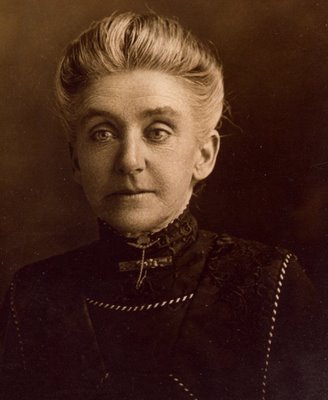
Today I spent a very happy afternoon in the State Library of SA, checking out the records of South Australian births, deaths and marriages since 1842, and am happy to report that I have finally filled the gaping hole in what was otherwise a full set of sixteen great-great-grandparents.
I tracked down the parents of this woman, born Florence Jane Cassidy Quigg in 1862, the redoubtable mother of my soldier grandfather in the Anzac Day post.
Turns out she's pure Irish on both sides: her parents Andrew and Eliza emigrated in the 1850s from Londonderry. Which makes my dad half Scots and a quarter each Cornish and Irish and therefore 100% Celt. The mystery of why he can neither give a direct answer to a simple question nor think logically in a straight line to save his life has finally been solved.
Wednesday, May 03, 2006
Pass the advocado
First the discussion of error and correction over at Kate's and now the scary antique exams in grammar and comprehension at Larvatus Prodeo, plus a jaw-dropping mispronunciation I heard last night on the news during a live cross to the Beaconsfield mine, have moved me to get a few miscellaneous snarks along these lines off my chest, thus:
* 'Exacerbate' is neither pronounced nor spelled 'exacerpate'.
* 'Antarctica' and 'ecstatic' both contain two Cs. They are not pronounced 'Ant-AR-tica' and 'uh-STATic'.
* 'Vulnerable' contains two Ls, and is therefore not pronounced 'vunnerable'.
* 'Congratulations' does not have a D in it.
* 'Phenomena' is the plural of 'phenomenon'.
* 'Criteria' is the plural of 'criterion'.
* 'Media' is the plural of 'medium'.
* And finally, since it's footy season once more: 'parochial' does not mean the same thing as 'partisan'. When in doubt, boys, look it up.

* 'Exacerbate' is neither pronounced nor spelled 'exacerpate'.
* 'Antarctica' and 'ecstatic' both contain two Cs. They are not pronounced 'Ant-AR-tica' and 'uh-STATic'.
* 'Vulnerable' contains two Ls, and is therefore not pronounced 'vunnerable'.
* 'Congratulations' does not have a D in it.
* 'Phenomena' is the plural of 'phenomenon'.
* 'Criteria' is the plural of 'criterion'.
* 'Media' is the plural of 'medium'.
* And finally, since it's footy season once more: 'parochial' does not mean the same thing as 'partisan'. When in doubt, boys, look it up.

Monday, May 01, 2006
I Heart Semaphore
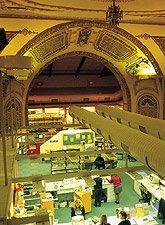 The Semaphore Library's Art Deco interior: originally the Mechanics' Institute, 1883.
The Semaphore Library's Art Deco interior: originally the Mechanics' Institute, 1883.My closest beach, five or ten minutes' drive away, is Semaphore in Adelaide's north-west. Heading towards the north-south coast at right angles across the flat, flat Adelaide plain, straight down into the sea (the jetty is pretty much an extension of the road), is the long, broad, boulevardy Semaphore Road, famous for its slightly run-down, out-of-the-wayish antique shops and currently enjoying a renaissance as a bit of a foodie haven.
There are several good restaurants, lots of substantial takeaway/eat-in places in various cuisines, an excellent bakery and ditto fruit and veg (beautiful produce plus local gourmet treats), a bunch of, erm, Alternative cafes, and several pubs -- one of them, the Federal Hotel, still seriously old style, by which I mean dusty blokes in dusty boots watching the races.
If you go for a walk out to the end of the jetty at dusk, past the hand-holding couples and the dedicated dog-walkers, past the rowdy, gawky teenage boys and the quiet Vietnamese families fishing off the side, you can look back at the shore and see a straight wide border of white sand, and across the esplanade a line of lights and giant pines, and behind the lights the black silhouette in the lavender sky of the Adelaide Hills across the city.
But in the daytime, which was what it was when I went down there last Sunday, everything is still blue and green and yellow instead of lavender and pearl. There are armies of kids and dogs. You can buy a fairy dress, some industrial-strength analgesics, a yiros with garlic sauce, Dutch-iris and hyacinth bulbs, a slab of coffee-and-walnut cake, and a bottle of what Leunig once called hospital brandy. You can borrow a basketful of library books. The signs say there'll be live music in three different places over the coming week.
And if you come to the Fed on a Thursday night, you can get a seven-dollar schnitzel and sing karaoke -- not necessarily in that order.
My kind of gig.
Subscribe to:
Comments (Atom)
